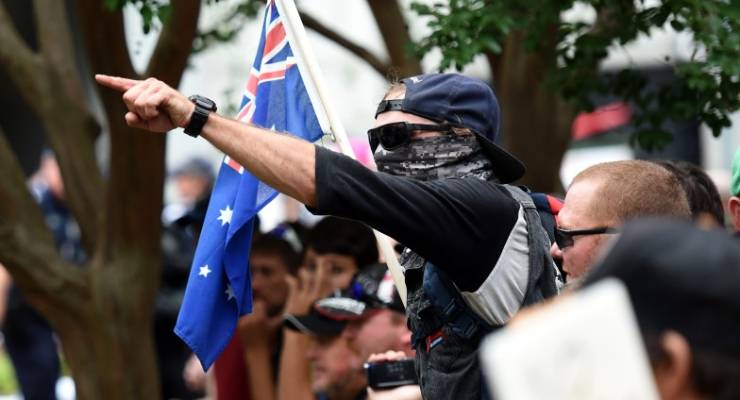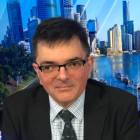
You could be forgiven for thinking that Home Affairs Minister Peter Dutton was obfuscating when he was asked specific questions about right-wing extremism during a doorstop late last week.
Dutton’s stance as expressed to journalists was that right-wing extremism will be dealt with like any other threat by Australia’s security agencies.
That is a purely operational, old school cop logic by Dutton. His argument is that individuals or groups identified as threats will be identified and managed irrespective of ideology.
It does not deal with the key challenge that right-wing extremism presents to Australians. There is a need to educate people about the fact that terrorists may look exactly like us, move within our midst and profess a belief in ideologies that are grounded in a combination of deep prejudice, advocacy of change through extreme violence, with a twist of anarchy.
The Labor Party’s proposed inquiry into right-wing extremism provides an opportunity for the community through its elected representatives to get a better understanding of the scope of the threat and what Australia as a country needs to do to lessen the likelihood that racist, violent and at times anarchic ideologies take hold.
Understanding the basis of an ideology provides a valuable lead to investigators and other people about what targets an individual or a group is likely to single out for special attention.
Take the various threats to the United States that were made by Osama bin Laden during the 1990s. Bin Laden warned the United States on multiple occasions that it would be a target of violence. Two such occasions include the famous interview with Peter Arnett broadcast on CNN in 1997 and also in a declaration of a jihad in February 1998.
These warnings can be linked to the bombings of American embassies in Africa that very year, the attack on the USS Cole in 2000, and the plot that saw the loss of 2977 lives on American soil on September 11, 2001.
The latter led to a “war on terror” aimed at global jihadists initially belonging to al-Qaeda, but later expanded to involve Islamic State when that group grew in strength and influence.
This intense focus in countries such as New Zealand on Islamist or global jihadist threats meant other extremist ideologies received less attention and fewer resources — a fact pointed to by the four volume royal commission report into the Christchurch terrorist attacks released yesterday.
That report describes at length the various steps the perpetrator took to communicate with and donate to various extreme right organisations.
It also looked at his family life, his personality, various factors that led to his radicalisation and preparations that were made for the March 15, 2019 terrorist attack.
This report on the Christchurch terrorist attacks, which also proposes a shake up of various agencies involved in intelligence and law enforcement to fix shortcomings found by the royal commission, may be a harrowing, sobering, and distressing account from which Australian authorities will learn a substantial amount, but this needs to be accompanied by a broader examination of the growing presence of adherents to extreme right ideologies in Australia.
Any review of this area needs to deal with the many and varied beliefs that fall under the banner of right-wing extremism. It is not limited to white nationalists, white supremacists, and neo-Nazis.
Crikey has previously reported that right-wing extremists have moved to less stringently moderated social media platforms and encrypted messaging services once Facebook and Twitter have banned them and certain of their followers.
An inquiry should explore how these various forums, encrypted platforms and social media applications such as TikTok operate and to what extent the operators of these platforms view it as their role to step in and more actively moderate extremist content posted on their servers.
There is also a need for an examination of how parents and guardians of young people exposed to extremist influences online can help them to steer clear of the strife that involvement in right-wing movements brings.
No politician with a conscience and concern for the well-being of their electorate and Australian society as a whole would want to be seen opposing an inquiry into right wing extremism in Australia.
This is far too important a discussion to be sullied by partisan games.








I read part 4 of the Christchurch Royal Commission report yesterday, which goes into detail about “the individual” and his life leading up to his decision to plan the attack. What stood out to me was how disconnected from normal social existence he was. He inherited enough money that he didn’t need to work, and travelled solo for years. With no job, no fixed abode and no regular day-to-day interactions with familiar people, there was little to keep him attached to the ‘real world’, no friction to slow his descent down the rabbithole. The power of extremist content is massively amplified in this situation.
Classic radicalisation behind a normal’ish facade; happens amongst other religions and/or culture too. Meanwhile extremists are found in mainstream including MPs and media spreading the message….
Point 1: Christchurch was the most successful and most tragic Australian terrorist attack in history thus far. Forget that at your peril, Australia. Point 2: it happened because for thirty plus years following the Aromoana massacre in NZ, New Zealand politicians failed to act to limit the capability available to a would-be terrorist or evil doer. Politicians need to be strategic and have foresight, Dutton has neither trait that I can discern. Point 3: social cohesion and inclusion is your best defence. Citizens are the eyes and ears of the country, they will be best placed to detect and report. Home Affairs and it’s leader should be leading on this, instead they are both mired in splitting and isolating. Point 4: national security and extremism need a mature, transparent debate. Not shouty voices from the sidelines, not tough guy rhetoric, not slang terms like ‘spy’. Mature, open debate and understanding. Good luck, Australia.
Excellent points, that Australia very likely will ignore at our peril.
Our ABC could devote a couple of hours of prime time analysis to the NZ report, but will get no encouragement, and more likely criticism and funding shortages, from our current government to do so.
We badly need some Jacinda Arderns over here.
The brief story earlier in Crikey gives a hint as to why an inquiry into right-wing extremism will never get support from this Gvt: with the extremist voices given a big airing on Sky News, there will be no rush to unpick the threads between the fringe dwellers of the Murdochracy and radicalisation.
Issue for too many nativist conservative MPs (mostly on right but found on left too), media and voters is that their own narratives, albeit more civilised and urbane, are based upon white supremacy or eugenics, like right wing extremists, from the US.
Why? Because US agit prop that we are now subjected to includes much political and PR messaging via media that focuses upon socio-cultural issues, that allow radical right libertarian policies to be implemented by ‘owned’ government or conservative parties.
No coincidence that influential radical right libertarians and /or white nationalist in the US crossover at the Koch influenced ALEC or ‘bill mill’, for a common purpose or political stratgey.
Australians do not seem bothered by, or now conditioned to, constant dog whistling of refugees, migrants, indigenous and minorities, through apportioning blame for negatives such as carbon emissions, house prices etc. on to e.g. (undefined) immigration and/or population growth; yet incapable of enacting any environmental legislation with teeth?
“This is far too important a discussion to be sullied by partisan games.”
Which is to say, it’s up there with global warming. And isn’t that going well?